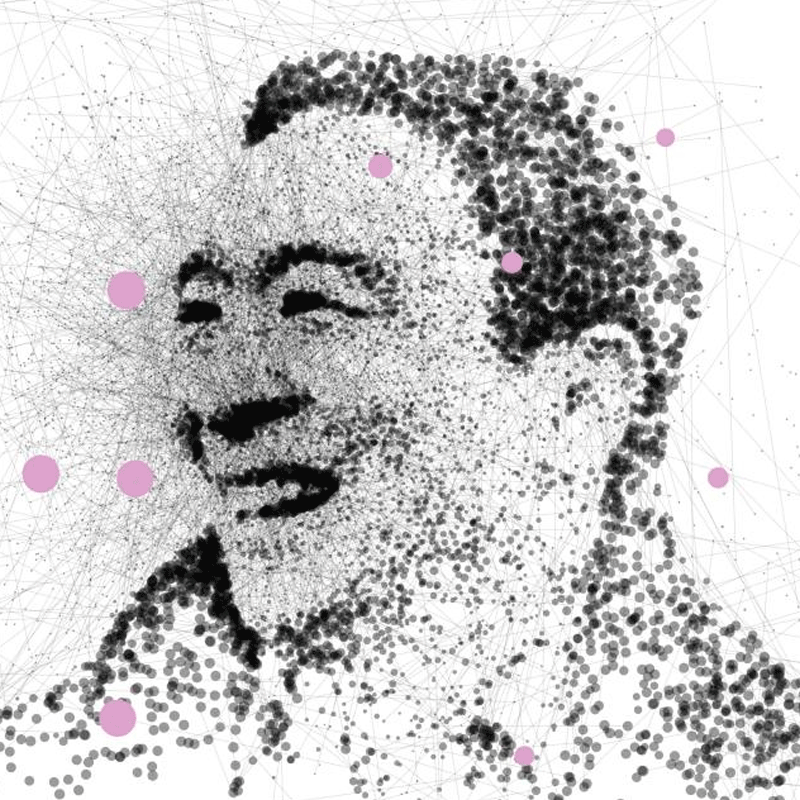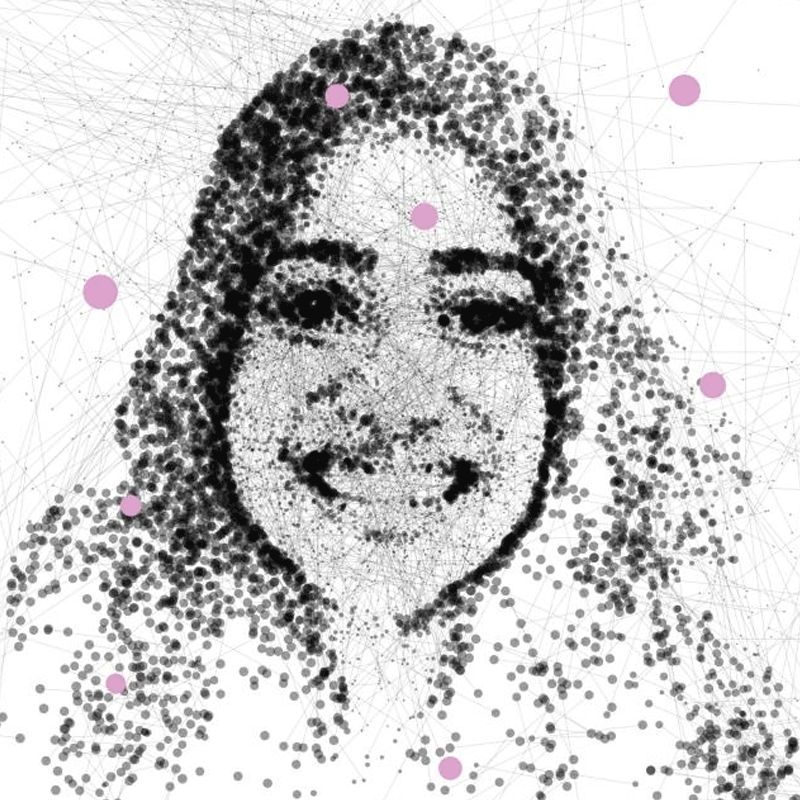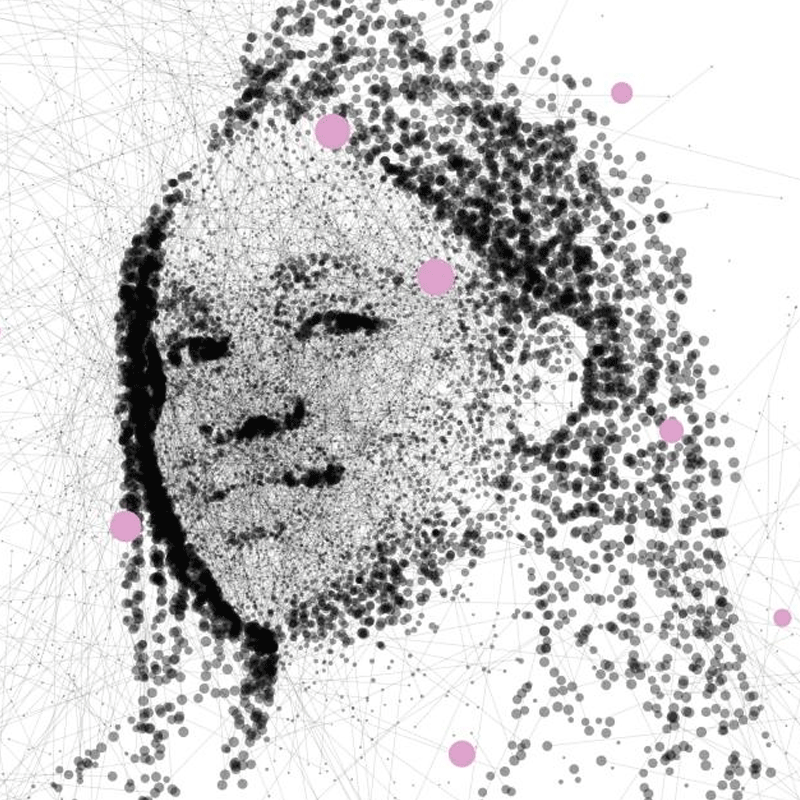December 18, 2021
2-minute read
During the past year, Stanford Digital Economy Lab researchers and affiliates published working papers and journal articles covering a range of topics related to the digital economy. From digital resilience to predictive analytics to racial segregation, these publications demonstrate how AI, machine learning, and other brilliant technologies are shaping society and the future of work.
Scroll down to find a collection of these remarkable working papers and articles from 2021. Looking for publications from previous years? Go here.
Brad Larsen, Matthew Backus, Thomas Blake, Steven Tadelis
February 3, 2021
Oxford Academic: The Quarterly Journal of Economics
We study patterns of behavior in bilateral bargaining situations using a rich new data set describing back-and-forth sequential bargaining occurring in over 25 million listings from eBay’s Best Offer platform. We compare observed behavior to predictions from the large theoretical bargaining literature. One-third of bargaining interactions end in immediate agreement, as predicted by complete-information models.
Jae Joon Lee, John A. Clithero, Joshua Tasoff
February 5, 2021
SSRN
Direct elicitation, guided by theory, is the standard method for eliciting latent preferences. The canonical direct-elicitation approach for measuring individuals’ valuations for goods is the Becker-DeGroot-Marschak procedure, which generates willingness-to-pay (WTP) values that are imprecise and systematically biased by understating valuations. We show that enhancing elicited WTP values with supervised machine learning (SML) can substantially improve estimates of peoples’ out-of-sample purchase behavior.
Riitta Katila, Sruthi Thatchenkery
February 25, 2021
Organization Science
How a firm views its competitors affects its performance. Simply put, firms with an unusual view of competition are more innovative. We extend the networks literature to examine how a firm’s positioning in competition networks—networks of perceived competitive relations between firms—relates to a significant organizational outcome, namely, product innovation. We find that when firms position themselves in ways that potentially allow them to see differently than rivals, new product ideas emerge.
John (Jianqiu) Bai, Erik Brynjolfsson, Wang Jin, Sebastian Steffen, Chi Wan
March 1, 2021
Oxford Academic: The Quarterly Journal of Economics
Digital technologies may make some tasks, jobs and firms more resilient to unanticipated shocks. We extract data from over 200 million U.S. job postings to construct an index for firms’ resilience to the Covid-19 pandemic by assessing the work-from-home (WFH) feasibility of their labor demand. Using a difference-in-differences framework, we find that public firms with high pre-pandemic WFH index values had significantly higher sales, net incomes, and stock returns than their peers during the pandemic.
Brad Larsen, Dominic Coey, Kane Sweeney, Caio Waisman
March 18, 2021
Marketing Science
This paper studies reserve prices computed to maximize the expected profit of the seller based on historical observations of the top two bids from online auctions in an asymmetric, correlated private values environment. This direct approach to computing reserve prices circumvents the need to fully recover distributions of bidder valuations.

Researchers Erik Brynjolfsson, Wang Jin, and Kristina McElheran surveyed more than 30,000 manufacturers and discovered a sizable increase in productivity among plants that use tools to automate prediction. In “The Power of Prediction,” the research team outlines their findings and offers reasons why some companies using predictive analytics aren’t seeing such gains. Recognized for excellence by the Strategic Management Society and the National Association of Business Economists.
Erik Brynjolfsson, Wang Jin, Sarah Bana, Xuipeng Wang, Sebastian Steffen
March 8, 2021
SSRN
Do firms react to data breaches by investing in cybersecurity talent? We assemble a unique dataset on firm responses from the last decade, combining data breach information with detailed firm-level hiring data from online job postings. Using a difference-in-differences design, we find that firms indeed increase their hiring for cybersecurity workers.
Susan Athey, Fiona Scott Morton
March 2021
NBER
In order to avoid competition, market leaders in platform markets often search for tactics. This paper considers a category of tactics that we refer to as “platform annexation,” designed to achieve this objective. Platform annexation refers to a practice where a platform takes control of adjacent tools, products, or services and operates them in a way that interferes with efficient multi-homing among platform users.
Seth Benzell, Avinash Collis, Christos Nicolaides
July 22, 2021
SSRN
The COVID-19 pandemic has called for and generated massive novel government regulations to increase social distancing for the purpose of reducing disease transmission. A number of studies have attempted to guide and measure the effectiveness of these policies, but there has been less focus on the overall efficiency of these policies.
Marshall Van Alstyne, Zhou Zhou, Lingling Zhang
June 3, 2021
One of the deepest platform challenges is understanding how users create network value for each other and which investments provide leverage. Is more value created by advertising to attract users, discounting to subsidize users, or investing in architecture to connect and retain users? Having grown a user network, which promotes “winner-take-all” dominance, why do platforms with large user bases fail?
Marshall Van Alstyne, Georgios Petropoulos, Geoffrey Parker
June 17, 2021
SSRN
WINNER OF THE 2022 ANTITRUST WRITING AWARD
Digital platforms are at the heart of online economic activity, connecting multi-sided markets of producers and consumers of various goods and services. Their market power, in combination with their privileged ecosystem position, raises concerns that they may engage in anti-competitive practices that reduce innovation and consumer welfare. This paper deals with the role of market competition and regulation in addressing these concerns.

Digital technologies are making some tasks, jobs, and firms more resilient to unanticipated shocks. S-DEL researchers extracted data from more than 200 million US job postings to construct an index that measure a firms’ resilience to the COVID-19 pandemic by assessing the work-from-home (WFH) feasibility of their labor demand.
Erik Brynjolfsson, Wang Jin, Kristina McElheran
June 29, 2021
Anecdotes abound suggesting that the use of predictive analytics boosts firm performance. However, large-scale representative data on this phenomenon have been lacking. Working with the U.S. Census Bureau, we surveyed over 30,000 manufacturing establishments on their use of predictive analytics and detailed workplace characteristics.
Brad Larsen, Daniel Keniston, Shengwu Li, J.J. Prescott, Bernardo S. Silveira, Chuan Yu
July 2021
NBER
This paper uses detailed data on sequential offers from seven vastly different real-world bargaining settings to document a robust pattern: agents favor offers that split the difference between the two most recent offers on the table. Our settings include negotiations for used cars, insurance injury claims, a TV game show, auto rickshaw rides, housing, international trade tariffs, and online retail.
Matthew Gentzkow, Amy Finkelstein, Heidi Williams
August 2021
American Economic Review
We estimate the effect of current location on elderly mortality by analyzing outcomes of movers in the Medicare population. We control for movers’ origin locations as well as a rich vector of pre-move health measures. We also develop a novel strategy to adjust for remaining unobservables, using the correlation of residual mortality with movers’ origins to gauge the importance of omitted variables.
Brad Larsen, Carol Hengheng Lu, Anthony Lee Zhang
August 26, 2021
NBER
We analyze data on tens of thousands of alternating-offer, business-to-business negotiations in the wholesale used-car market, with each negotiation mediated (over the phone) by a third-party company. We find that who intermediates the negotiation matters: high-performing mediators are 22.03% more likely to close a deal than low performers.
Erik Brynjolfsson, Jason Dowlatabadi, Meng Liu
August 27, 2021
Management Science
Traditional marketplaces are prone to market inefficiencies such as moral hazard due to information asymmetries between market participants. Digital platforms often build transparency and dispute resolution mechanisms into their marketplaces. This may reduce moral hazard.

Does the text content of a job posting predict the salary offered for the role? There is ample evidence that even within an occupation, a job’s skills and tasks affect the job’s salary. Using a dataset of salary information linked to posting data. postdoctoral fellow Sarah Bana is applying natural language processing (NLP) techniques to build a model that predicts salaries from job posting text.
Seth Benzell, Victor Yifan Ye, Laurence Kotlikoff, Guillermo LaGarda
September 21, 2021
NBER
This paper develops a 17-region, 3-skill group, overlapping generations, computable general equilibrium model to evaluate the global consequences of automation. Automation, modeled as capital- and high-skill biased technological change, is endogenous with regions adopting new technologies when profitable. Our approach captures and quantifies key macro implications of a range of foundational models of automation.
Sarah Bana
October 8, 2021
Does the text content of a job posting predict the salary offered for the role? There is ample evidence that even within an occupation, a job’s skills and tasks affect the job’s salary. Capturing this fine-grained information from postings can provide real-time insights on prices of various job characteristics. Using a new dataset from Greenwich.HR with salary information linked to posting data from Burning Glass Technologies, I apply natural language processing (NLP) techniques to build a model that predicts salaries from job posting text.
Erik Brynjolfsson, Seth Benzell, Guillaume Saint-Jacques
November 4, 2021
Digital technologies are creating dramatically cheaper and more abundant substitutes for many types of ordinary labor and capital. If these inputs are are becoming more abundant, what is constraining growth? We posit that most growth requires a third factor, a scarce `bottleneck’ input, that cannot be duplicated by digital technologies.
Erik Brynjolfsson, Seth Benzell
November 4, 2021
NBER
We introduce a model of technological advances as allowing for greater productivity at the cost of increased complexity. Complex goods and services, like Swiss watches, require a large number of strongly complementary inputs which themselves must be precisely calibrated.
Susan Athey, Billy Ferguson, Matthew Gentzkow, Tobias Schmidt
November 16, 2021
Proceedings of the National Academy of Science of the United States of America
Racial segregation shapes key aspects of a healthy society, including educational development, psychological well-being, and economic mobility. As such, a large literature has formed to measure segregation. Estimates of racial segregation often rely on assumptions of uniform interaction within some fixed time and geographic space despite the dynamic nature of urban environments. We leverage Global Positioning System data to estimate a measure of segregation that relaxes these strict assumptions.
Avinash Collis, Alex Moehring, Ananya Sen, Alessandro Acquisti
November 30, 2021
SSRN
We investigate how consumer valuations of personal data are affected by real-world information interventions. Proposals to compensate users for the information they disclose to online services have been advanced in both research and policy circles. These proposals are hampered by information frictions that limit consumers’ ability to assess the value of their own data.
July 19, 2021
4 min read
Automation is on the rise. The nature of work is rapidly changing. And businesses and California policymakers are dealing with a growing set of challenges and opportunities presented by the state’s evolving workforce and job market.
The Stanford Digital Economy Lab (S-DEL) and the Stanford Institute for Economic Policy Research (SIEPR) are embarking on research that will help evaluate how artificial intelligence and machine learning will impact the future of work in California for the next century. The project begins this summer and will be led by S-DEL Director Erik Brynjolfsson and SIEPR Director Mark Duggan.
The work will be performed in collaboration with California 100, an initiative to envision and shape the long-term success of the state. Incubated at the University of California and Stanford University, the California 100 initiative will focus on creating policy recommendations to ensure the state’s sustainability, innovation, and equity for the next century.
“The vision of the California 100 initiative aligns perfectly with the Lab’s vision of building a technology-driven economy that benefits everyone,” said Brynjolfsson. “We look forward to being a part of a project that helps companies and workers in California take on the challenges and opportunities posed by digitization and automation.”
Stanford researchers will develop a Future of Work Dashboard that draws on S-DEL’s data and insights to illustrate the transformation of jobs throughout California. The dashboard will sample a range of occupations across different regions, wage levels, education levels, and skill bundles to assess the resilience of each job to automation. The data will also highlight the most valuable skills in each occupation, suggest adjacent lines of work, and provide a comprehensive outlook for each position.
The Future of Work Dashboard will utilize data from ongoing Stanford Digital Economy Lab research, including the following research areas and projects.
Researchers will address issues tied to tax policy and minimum wage and their impact on innovation and automation. “Rigorous, data-driven research is the foundation for creating good economic policy,” Duggan said. “Our work at SIEPR has long informed policy decisions at the local, state, and federal levels, and this is an opportunity for us to make important contributions to California’s economic future.”
Stanford’s research and insights will inform a broad set of policy recommendations that will be developed in conjunction with research from other universities and research institutions. The research will be completed in December 2021.
Follow us on Twitter for updates about the California 100 initiative, as well as other S-DEL research projects.
A March 2021 report released by the Future of Work Commission detailed what must be done to ensure inclusive and long-term economic growth in California. The Commission, which included Stanford HAI co-director Fei-Fei Li and HAI advisors Mary Kay Henry and James Manyika, devoted 18 months to meeting and listening to workers, employers, researchers, and other members of civil society to understand the current state and future of work and workers in California.
2021 HAI Fall Conference
Policy & AI: Four Radical Proposals for a Better Society
November 9-10, 2021
Virtual event
Last spring, scholars at Stanford Institute for Human-Centered AI put forth a call: What are the most radical policy proposals focused on emerging technologies that could respond to the challenges and opportunities of an AI-powered future?
This November, some of the most ambitious proposals will be discussed and debated during the Stanford HAI 2021 Fall Conference, “Policy and AI: Four Radical Proposals for a Better Society.” The proposals include:
“Universal Basic Income to Offset Job Losses Due to Automation”
Andrew Yang, politician and former presidential candidate
“Data Cooperatives Could Give Us More Power Over Our Data”
Divya Siddarth, associate political economist and social technologist at Microsoft
“Middleware Could Give Consumers Choices Over What They See Online”
Francis Fukuyama, senior fellow at the Freeman Spogli Institute for International Studies
“Third-Party Auditor Access for AI Accountability”
Deborah Raji, fellow, Mozilla Foundation, and CS PhD student, UC Berkeley
During the online conference, each proposal will be vetted by a panel of experts from academia, industry, government, and civil society. Audience members will be encouraged to ask questions and join the conversation.
This year’s conference will feature a keynote speech by Eric Lander, the President’s Science Advisor and Director of the White House Office of Science and Technology Policy (OSTP).
Erik Brynjolfsson
Conference Co-host
Director, Stanford Digital Economy Lab
Senior Fellow, Stanford HAI
Daniel Ho
Conference Co-host
Professor, Stanford Law School
Associate Director, Stanford HAI
Stanford Digital Economy Lab Director Erik Brynjolfsson and Daniel E. Ho, Stanford Law School professor and Stanford HAI associate director, will co-host the conference.
“I’m excited about the range of incredible speakers who will be engaging in these four ambitious proposals,” said Ho. “Proposers include public intellectuals like Frank Fukuyama and rising stars like Deb Raji, and the panels represent a true range of backgrounds, from politicians to social scientists, and technologists to technology skeptics.”
Brynjolfsson defined the term “radical“ in the context of the conference. “We chose proposals to be ‘radical’ in the sense that they are not small technocratic fixes,” he said. “They are ambitious proposals that grapple with fundamental problems and will require a change in outlook to adopt. At the same time, we don’t want proposals that are simply pie-in-the-sky dreams that have no hope of being implemented.”
Registration for the virtual two-day event is free and open to everyone.

A group of researchers, including Stanford professor Francis Fukuyama, are advocating for a competitive market in middleware to lessen internet platforms’ power over democratic political debate.

Former presidential candidate Andrew Yang proposes giving every American adult $1,000 a month to avert an economic crisis.

Economist Divya Siddarth and her colleagues propose creating data cooperatives that would function as intermediary fiduciaries who would negotiate with companies and other entities to establish guidelines around the use of our shared data.

Deb Raji, a fellow at the Mozilla Foundation and PhD student at UC Berkeley, proposes legal protections and regulatory involvement to support organizations that uncover algorithmic harm.
Our weekly Seminar Series features researchers and experts discussing topics focused on AI and the digital economy. A big thanks to all the colleagues and collaborators who joined us throughout the quarter to share their time and insights.
October 4, 2021
Melissa Dell
Harvard University
October 8, 2021
Lynn Wu
The Wharton School
November 1, 2021
Laura Veldkamp
Columbia Business School
November 15, 2021
Sendhil Mullainathan
The University of Chicago Booth School of Business
December 6, 2021
Tomás Pueyo
Unchartered Territories
September 16, 2021
1 min read
Capgemini, a global firm that focuses on consulting, digital transformation, technology, and engineering services, has signed on to become the first member of the Stanford Digital Economy Lab Corporate Affiliate Program.
The newly launched corporate program will create opportunities for industry professionals to network with leading academics and discuss key topics related to the digital economy. The events and activities are designed to promote knowledge-sharing, brainstorming, and to discuss datasets that could further S-DEL’s research portfolio.
“We are delighted to have Capgemini as the inaugural corporate affiliate member, and we are looking forward to working with their experts and clients to find innovative and actionable solutions,” said Erik Brynjolfsson, director of the Stanford Digital Economy Lab. “Industry engagement is essential to understanding the opportunities and obstacles ahead. With collaborators like Capgemini, we will be better able to help policymakers, businesses, and professionals rise to the challenges created by digitization and address the digital divide.”
As a corporate affiliate, Capgemini will draw from its Applied Innovation Exchange and global client database to collaborate with S-DEL researchers on a diverse set of topics. Their first collaboration may focus broadly on Digital Platforms, one of the Lab’s five research focus areas, with a specific project to be scoped together over the coming months.
“Collaboration between industry and academia is key to addressing the many questions that the digital economy has raised, and will continue to raise, in the years to come,” said Andreas Sjöström, Leader of Capgemini’s Applied Innovation Exchange in San Francisco. “We’re greatly looking forward to our work with the researchers at the Stanford Digital Economy Lab, and combining our resources, knowledge, and insights with their own to drive true innovation and create meaningful, positive change for all.”
Is your company interested in becoming an S-DEL Corporate Affiliate? Contact Christie Ko at christieko@stanford.edu.

Stanford Digital Economy Lab Corporate Affiliates receive invitations to our events and have the opportunity to talk with Lab faculty, staff, students, and fellows. Corporate Affiliates may also have the option to engage in Lab research projects.